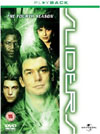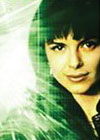At the time I first saw this, I was intrigued by the Wade story. That arc might have been great had they followed through with Sabrina Lloyd's presence at some point. But with no sign of her agreeing to ever do the show again, they should have given her a happy exit long ago and dropped this. Oh well. It doesn't really hurt this episode, but it makes you wish for things that will never be. All the same, it also seems that the characters inexplicably ignore one of the most logical questions to ask. When traveling across parallel/branching dimensions, one often encounters doubles of oneself and one's friends and family members. So... which of Wade's many, many doubles was in that Kromagg camp? Which doubles of Quinn and Rembrandt and Maggie did she tell stories of? Is there any truly good reason to believe that this was our Wade and not a double that we just missed? You can see here that the writers got so excited about long-term Kromagg arcs that they forgot the main premise of the series. Oh well. But there is so much good writing and good drama here, that the futility of the Wade arc can't truly hurt this episode. If anything, the story gains more than it sacrifices from this angle.
Bizarrely, we've had five Kromagg stories so far this season, and haven't seen any individual Kromagg guest star appear more than once. This is a pity, as it would help with the show's continuity enormously. But at least here, we see a lot of the Kromaggs' abilities put to good use, showing how they slide and deal with problems, and also defining some of the parameters and limitations of their powers of illusion. Good stuff. If there's something not tackled here, perhaps it is the magical healing power that the Kromaggs often have, and why it isn't effective against the biological weapon employed here. The story brings up some disturbing topics which don't have easy answers, which is always a good source for rich drama. But I think we should note that the answers don't seem easy largely because Kromaggs now have a reputation for being one-dimensionally villainized, such that the human characters can find no redeeming qualities in their existence or behaviour. Perhaps this episode is best in hinting at those missing dimensions, and making you wonder if they exist or if the evidence suggesting them is just another Kromagg mental deception. It would be easy to just anthropomorphize the Kromaggs and get it over with, as Star Trek always does with its aliens, to more easily deliver the heartwarming endings that Trek thrives on, but "Mother and Child" successfully retains some ambiguity in the nature of Kromagg thought and philosophy. Though they have here risen somewhat above the depths of Nazification that they often fell into in their other season four stories, this World War II stigma is still shading their characters here. At least this episode delivers the best food for thought yet on Kromagg issues. The Sliders actually direct their slide in this story - an excellent logical move that we should get more of on this show. Why they decide to go back to random sliding at the end is something not clearly explained. If there's one thing I don't like too much, it is that the woman decides to move on to another world at the end. What's that about? They had a house, they had antidote for the child. And the Sliders promise to dump her on the next random world no matter what it is? I think we're preserving Gilligan's Island Syndrome past the point of rational sense here. If she really wants to move on, fine, but the Sliders need to see the world that they're depositing her on before they insist that she can't come along anymore, otherwise they start to look heartless, and we wouldn't want that now would we?
This story has become available on DVD. Click on the Amazon symbol for the location nearest you for pricing and availability:
Comments on this article are welcome. You may contact the author from this page:
|








